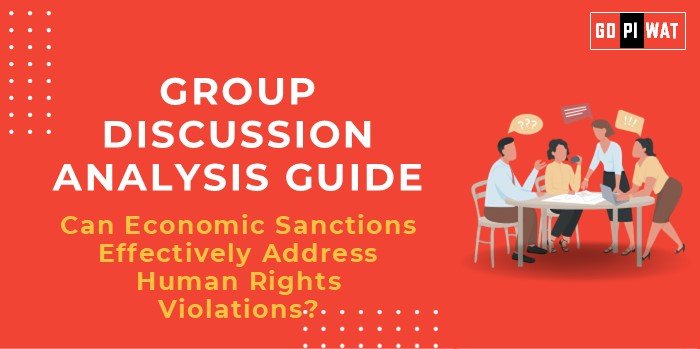📋 GD Analysis: Can Economic Sanctions Effectively Address Human Rights Violations?
🌐 Introduction to the Topic
Opening Context: Economic sanctions are a common international policy tool, employed to address issues like nuclear proliferation, territorial conflicts, and human rights violations. Their efficacy, however, remains debated.
Topic Background: Economic sanctions trace their roots to the League of Nations but gained prominence during the Cold War. Recent sanctions on countries like Russia, Iran, and Myanmar highlight their global relevance in addressing human rights issues.
📊 Quick Facts and Key Statistics
🌍 Global Use of Sanctions: Over 30 countries face sanctions from organizations like the UN, EU, and US, targeting human rights violations.
📉 Economic Impact: Sanctions on Russia in 2022 led to a GDP decline of 2.1%.
⚠️ Humanitarian Fallout: 70% of Syria’s population lives below the poverty line due to prolonged sanctions.
📈 Success Rate: Only about 34% of sanctions achieve their intended policy outcomes (Peterson Institute for International Economics).
📉 Economic Impact: Sanctions on Russia in 2022 led to a GDP decline of 2.1%.
⚠️ Humanitarian Fallout: 70% of Syria’s population lives below the poverty line due to prolonged sanctions.
📈 Success Rate: Only about 34% of sanctions achieve their intended policy outcomes (Peterson Institute for International Economics).
🧑💼 Stakeholders and Their Roles
- Governments: Enact and enforce sanctions to pressure compliance.
- International Organizations: UN, EU, and others facilitate multilateral sanctions for global legitimacy.
- Private Corporations: Adhere to sanctions through restricted trade and investment.
- Affected Citizens: Often bear the brunt of sanctions via economic hardship.
🎯 Achievements and Challenges
Achievements:
- South Africa: Sanctions helped dismantle apartheid.
- Myanmar: Sanctions pressured the junta into initial democratic reforms (2011).
- Iran Nuclear Deal: Sanctions paved the way for the 2015 agreement.
Challenges:
- Limited Target Impact: North Korea’s elite remains unaffected despite sanctions.
- Humanitarian Crises: Iraqi sanctions (1990s) led to massive civilian casualties.
Global Comparisons:
- Success: EU sanctions on Belarus’ human rights violations gained regional support.
- Failure: US sanctions on Venezuela exacerbated economic collapse without achieving political change.
💬 Structured Arguments for Discussion
- Supporting Stance: “Sanctions can effectively curb human rights abuses by isolating offending states economically and diplomatically.”
- Opposing Stance: “Sanctions often harm civilians more than governments, failing to incentivize human rights compliance.”
- Balanced Perspective: “While sanctions can pressure governments, their success hinges on multilateral coordination and minimizing humanitarian fallout.”
📝 Effective Discussion Approaches
Opening Approaches:
- Start with historical examples (e.g., South Africa).
- Highlight a recent case, like Russia-Ukraine sanctions.
Counter-Argument Handling:
- “While sanctions harm civilians, mechanisms like humanitarian carve-outs can mitigate such effects.”
🔍 Strategic Analysis of Strengths and Weaknesses
- Strengths: Multilateral enforcement, economic leverage.
- Weaknesses: Civilian impact, limited enforcement in authoritarian regimes.
- Opportunities: Enhancing international cooperation, targeted sanctions.
- Threats: Retaliation from targeted states, undermining global trade.
🏫 Connecting with B-School Applications
Real-World Applications: Exploring sanctions in courses like International Relations, Trade, or Law.
Sample Interview Questions:
- “How can sanctions be optimized to avoid humanitarian crises?”
- “Compare sanctions and military interventions as policy tools.”
Insights for B-School Students: Consider sanctions’ impact on global markets and supply chains.


